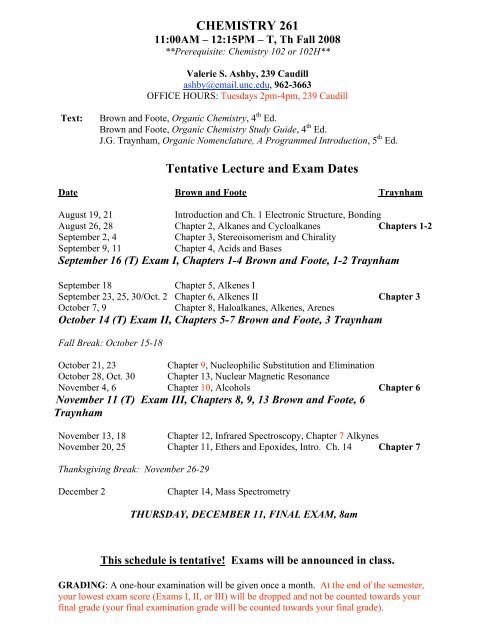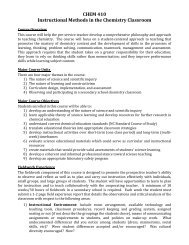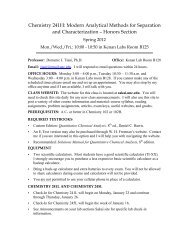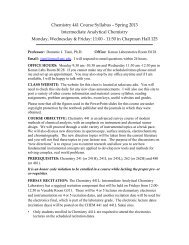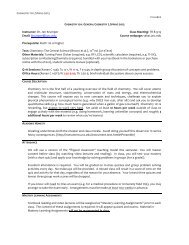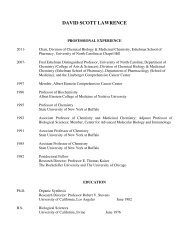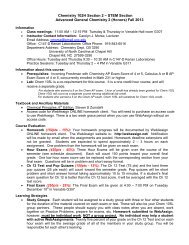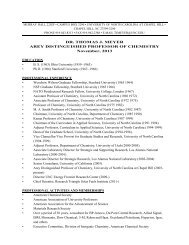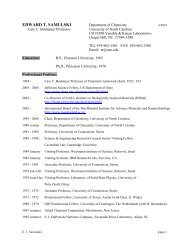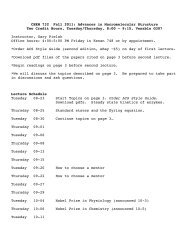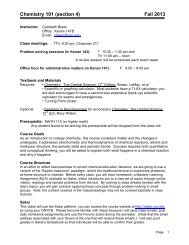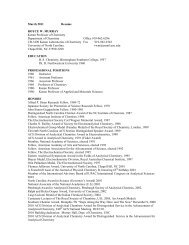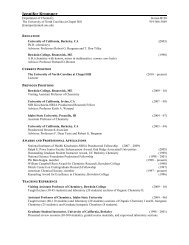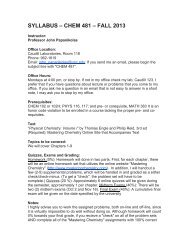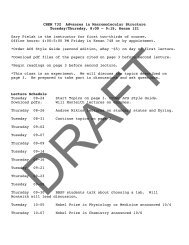CHEMISTRY 261 Tentative Lecture and Exam Dates
CHEMISTRY 261 Tentative Lecture and Exam Dates
CHEMISTRY 261 Tentative Lecture and Exam Dates
Create successful ePaper yourself
Turn your PDF publications into a flip-book with our unique Google optimized e-Paper software.
<strong>CHEMISTRY</strong> <strong>261</strong>11:00AM – 12:15PM – T, Th Fall 2008**Prerequisite: Chemistry 102 or 102H**Valerie S. Ashby, 239 Caudillashby@email.unc.edu, 962-3663OFFICE HOURS: Tuesdays 2pm-4pm, 239 CaudillText:Brown <strong>and</strong> Foote, Organic Chemistry, 4 th Ed.Brown <strong>and</strong> Foote, Organic Chemistry Study Guide, 4 th Ed.J.G. Traynham, Organic Nomenclature, A Programmed Introduction, 5 th Ed.<strong>Tentative</strong> <strong>Lecture</strong> <strong>and</strong> <strong>Exam</strong> <strong>Dates</strong>Date Brown <strong>and</strong> Foote TraynhamAugust 19, 21Introduction <strong>and</strong> Ch. 1 Electronic Structure, BondingAugust 26, 28 Chapter 2, Alkanes <strong>and</strong> Cycloalkanes Chapters 1-2September 2, 4Chapter 3, Stereoisomerism <strong>and</strong> ChiralitySeptember 9, 11Chapter 4, Acids <strong>and</strong> BasesSeptember 16 (T) <strong>Exam</strong> I, Chapters 1-4 Brown <strong>and</strong> Foote, 1-2 TraynhamSeptember 18Chapter 5, Alkenes ISeptember 23, 25, 30/Oct. 2 Chapter 6, Alkenes II Chapter 3October 7, 9Chapter 8, Haloalkanes, Alkenes, ArenesOctober 14 (T) <strong>Exam</strong> II, Chapters 5-7 Brown <strong>and</strong> Foote, 3 TraynhamFall Break: October 15-18October 21, 23Chapter 9, Nucleophilic Substitution <strong>and</strong> EliminationOctober 28, Oct. 30 Chapter 13, Nuclear Magnetic ResonanceNovember 4, 6 Chapter 10, Alcohols Chapter 6November 11 (T) <strong>Exam</strong> III, Chapters 8, 9, 13 Brown <strong>and</strong> Foote, 6TraynhamNovember 13, 18 Chapter 12, Infrared Spectroscopy, Chapter 7 AlkynesNovember 20, 25 Chapter 11, Ethers <strong>and</strong> Epoxides, Intro. Ch. 14 Chapter 7Thanksgiving Break: November 26-29December 2Chapter 14, Mass SpectrometryTHURSDAY, DECEMBER 11, FINAL EXAM, 8amThis schedule is tentative! <strong>Exam</strong>s will be announced in class.GRADING: A one-hour examination will be given once a month. At the end of the semester,your lowest exam score (<strong>Exam</strong>s I, II, or III) will be dropped <strong>and</strong> not be counted towards yourfinal grade (your final examination grade will be counted towards your final grade).
NO MAKEUP EXAMS WILL BE GIVEN. If an exam is missed for any reason, that will bethe one not counted.All students must take the final examination.The grade for this course will be computed as follows: two hour exams (25% each) + final exam(50%).Your letter grade will be calculated at the end of the semester <strong>and</strong> will be based on a class curve.Regardless of this curve calculation, any final scores that are below 40% of the total points (
<strong>CHEMISTRY</strong> <strong>261</strong>Fall 2008Suggested ProblemsChapter 1: 3-6; 13a,b; 14a,b; 15; 19c,d; 21-23; 25-26c,e,f; 27a; 28a-c; 29; 32-34a; 35; 37;39a; 40; 42-43; 47-48; 51a; 55; 57; 63; 64; 67; 69; 70a,b. Note the answer to 61.Chapter 2: 1; 8-14a; 16-17; 19; 23; 25; 28-30; 34; 43; 44; 47; 51-54; 57.Chapter 3: 1-4; 6; 7; 9; 10; 13; 15; 17-22; 24-27; 30; 31. Note the answer to 12.Chapter 4: 2-4; 6b; 7; 9a,b; 11a-c; 14-15; 17c,d; 20-21b-d; 25; 28; 29; 32b; 33; 39-41; 45c-d.Chapter 5: 2a,b; 7; 9; 10; 11b-o; 13; 14; 16; 23; 25-27.Chapter 6: 3-11; 13; 15a,c,d; 16; 17a-f; 18; 19a-d; 20a,b; 21; 24; 26; 28; 30; 33; 36-39.Chapter 7: 5; 7; 8; 10; 11a,c; 12; 24b,c; 27.Chapter 8: 1; 2; 5-8; 10; 11a-c; 12a-e; 13a-e; 14; 16-19; 21-25; 27-29; 33a-c; 36-37a; 42-44b-e; 46a-c, g-i; 47; 48.Chapter 9: 2; 4-9; 11; 14; 16a-n; 18-24; 26; 27c,d; 28; 29 (use ballpark pK a ’s); 30-33;36a,b,d-i; 41-42.Chapter 10: 3-5; 8-13; 15-17; 19; 21-23a-c; 24a,d,e; 25; 26; 28; 30.Chapter 11: 2-4; 6; 11-13; 15-18; 20; 24; 28; 30; 32; 34.Chapter 12: 2; 3b-9; 12a-d, f-j.Chapter 13:1 H NMR (1): 2-5. 1 H NMR (11): 6,7,19,20,29. 13 C NMR: 8, 9, 16, 17, 26, 32.Chapter 14: 4a,b,d; 8; 9; 18; 24a.Chapter 15: 1-4; 6; 7; 9-14; 16; 25.
Welcome to Organic Chemistry!COURSE GOALBy the end of this course, students should be able to communicate both graphically <strong>and</strong> verbally theproper starting materials, reagents, <strong>and</strong> products necessary to complete successful synthetic organicreactions according to the rules outlined by the molecular orbital theory <strong>and</strong> valence bond theory.OBJECTIVESBy the end of this course, students should be able to:1. Identify structures using both IUPAC <strong>and</strong> common nomenclature.2. Draw the correct starting materials, reagents, or products that complete successful reactions.3. Evaluate the steps involved in organic reactions using mechanisms.4. Know several research opportunities available to undergraduate students.How <strong>and</strong> what to study:Many students are not quite sure exactly how to best study organic chemistry. As the final grade of thisclass is looked highly upon by higher education institutions such as medical schools, it is imperative thatyou’re studying at the highest level possible. Studying organic chemistry requires a certain level ofcritical thinking that is imperative for performing well on a test. Here, I outline a procedure that I hopewill help you achieve the highest grade earned according to your level of studying.1. Draw, draw, draw! There will be reactions <strong>and</strong> structures on your tests that you have never seenbefore. Only good practice at drawing new structures will allow you to succeed in synthesizingor evaluating these new compounds. While you’re studying for the examinations, use only apencil <strong>and</strong> many sheets of white computer paper. Not worrying about making mistakes <strong>and</strong>starting over when mistakes are made is also crucial.2. Practice! Like learning a new language or how to play a new musical instrument, learning theconcepts of organic chemistry is an art form that requires frequent practice. Cramming forexaminations may work for other courses, but it has been proven to be ineffective for receivinggood marks in organic chemistry.3. Study in groups! Being able to communicate the language of organic chemistry is crucial foryour success on examinations. There is only one way to practice this communication: study witha friend. Studying in groups should not be your only method, however. You should also studyby yourself to fully grasp the concepts.4. Underst<strong>and</strong>, don’t memorize! One cannot perform well on an organic chemistry exam utilizingmemory alone. As previously mentioned, there will be structures on the tests that you have neverseen before. And one cannot memorize something they’ve never seen before!5. Think small! On the examination, there will be portions of molecules that may not be pertinentto the question at h<strong>and</strong>. Focus on the important parts of the compound involved in the chemistry.Like a doctor trying to diagnose a patient, one must whittle down any extraneous information tofind the correct answer.


